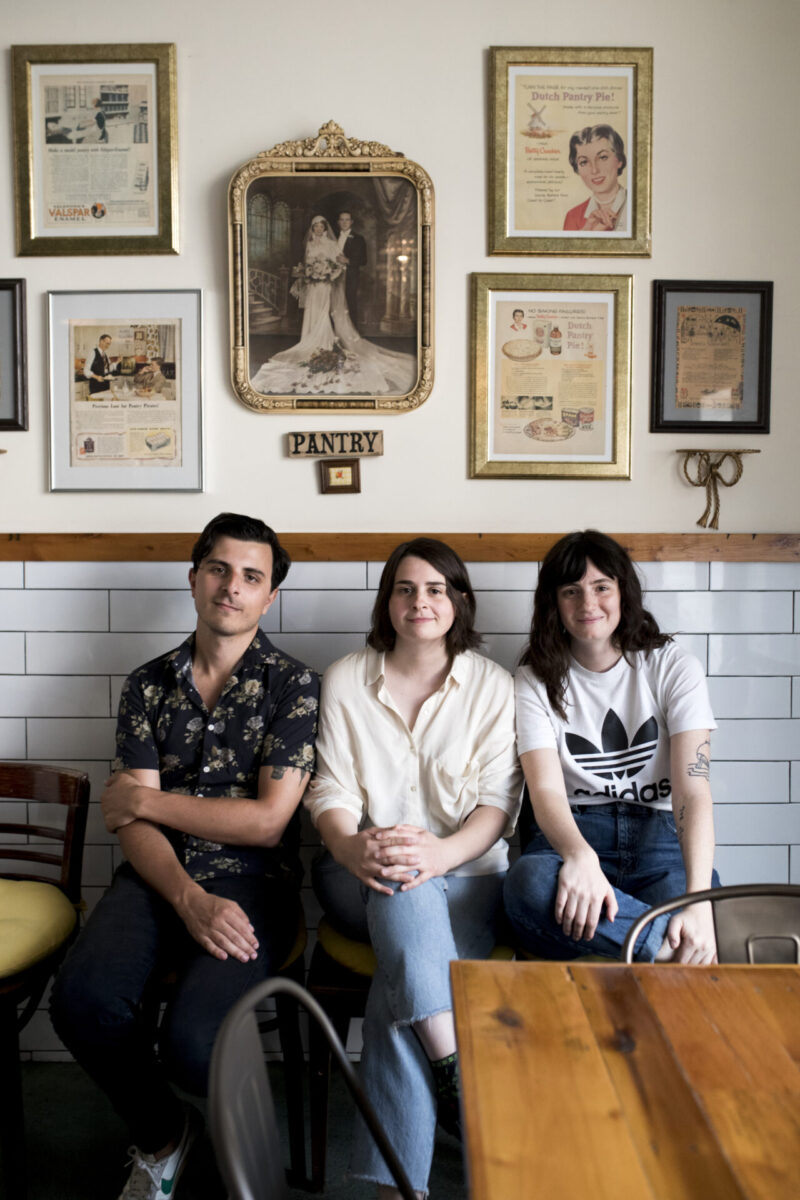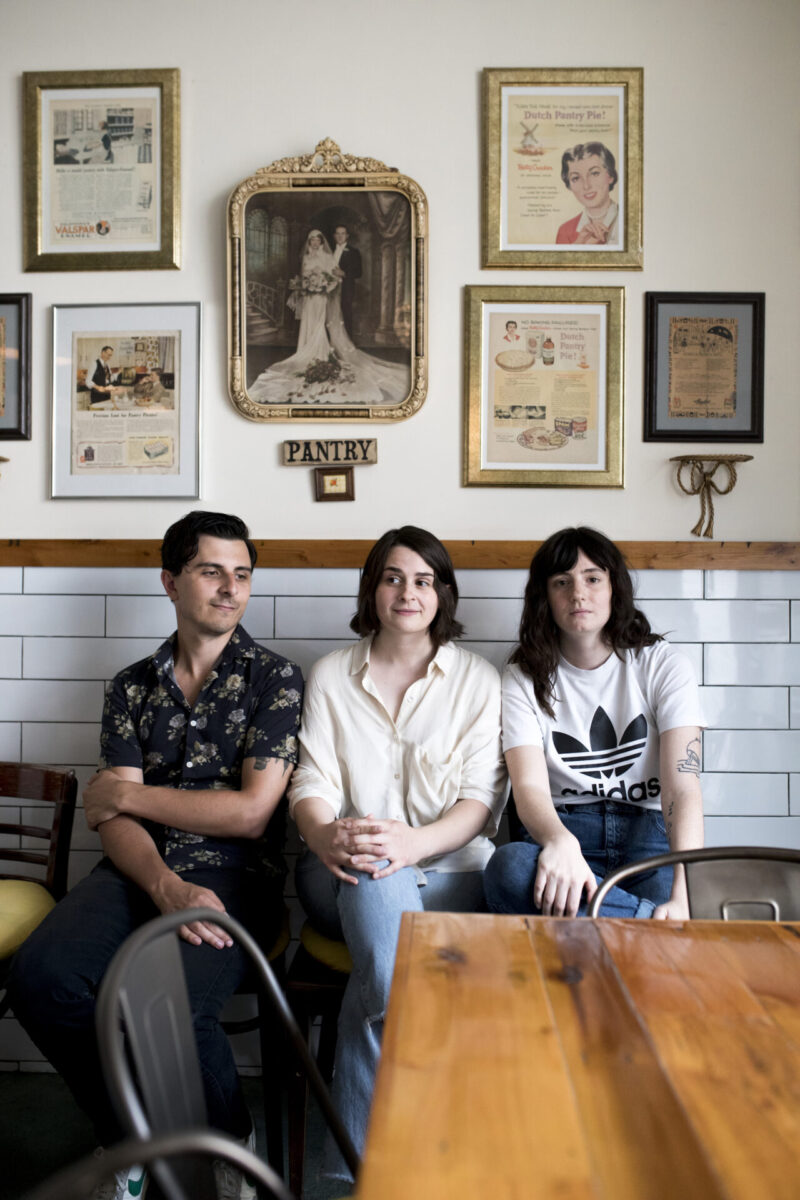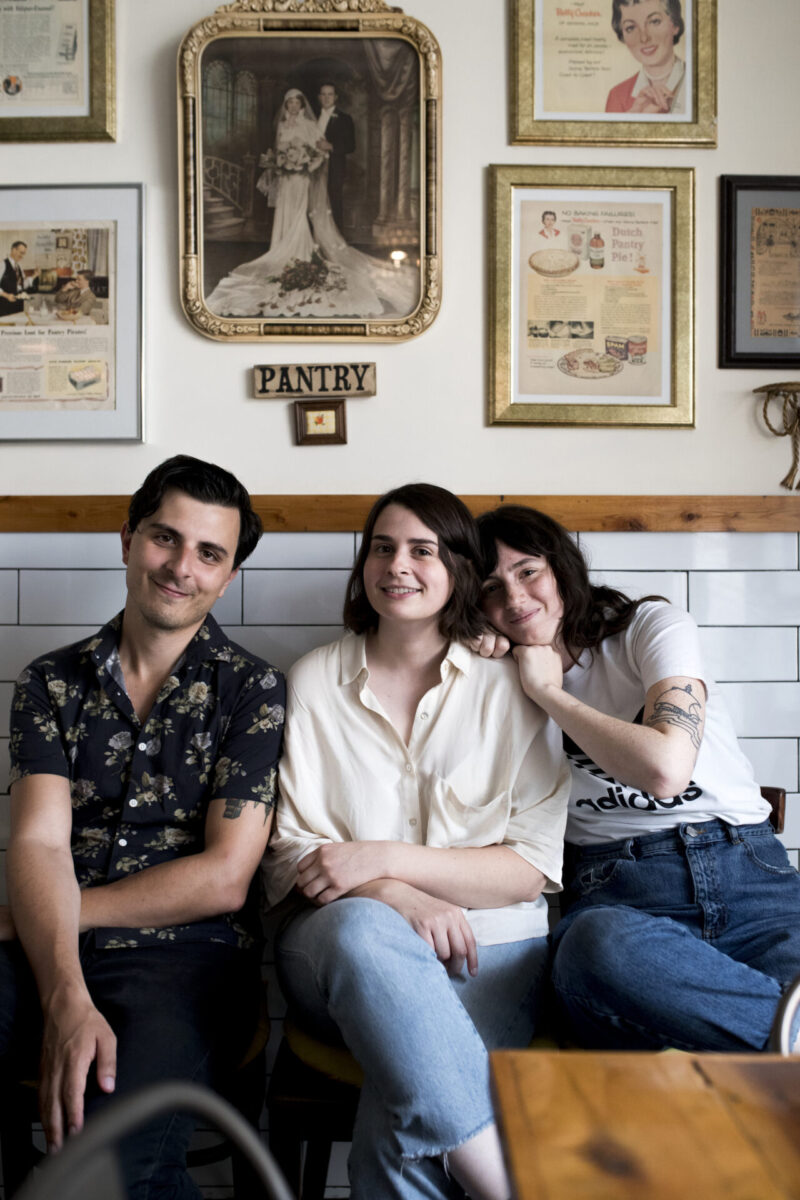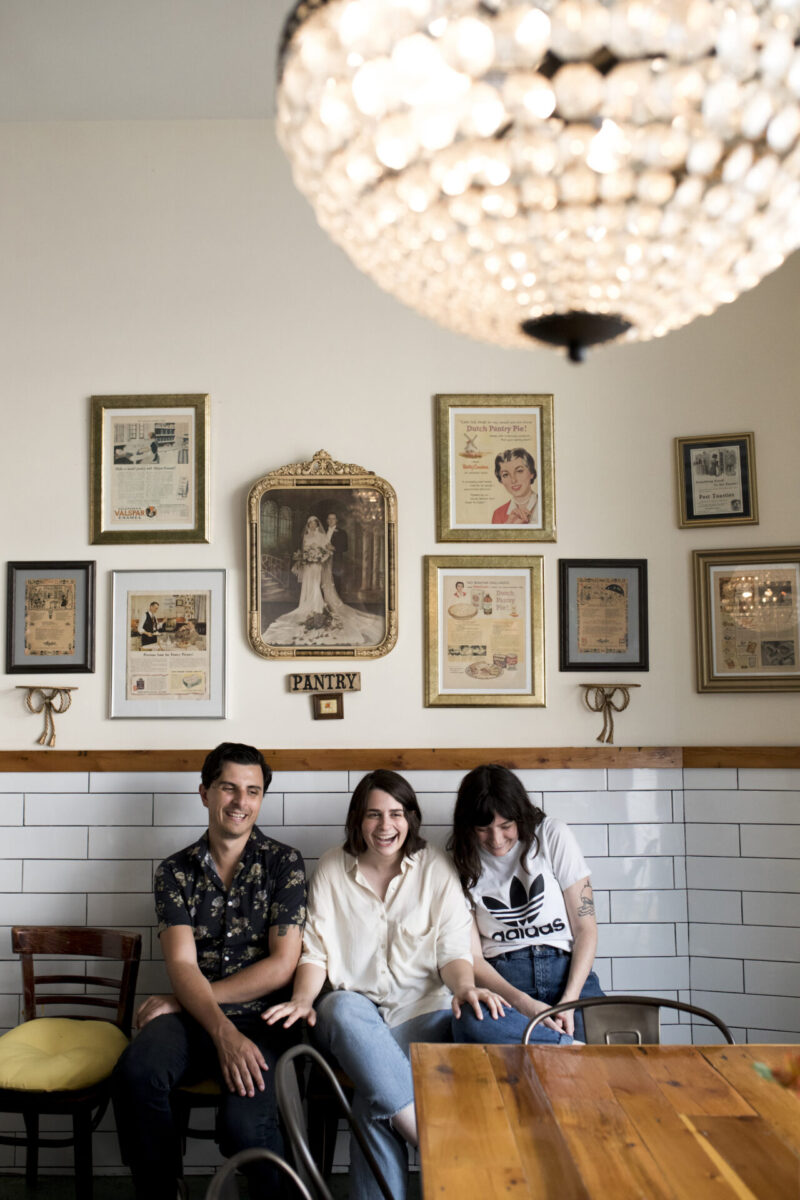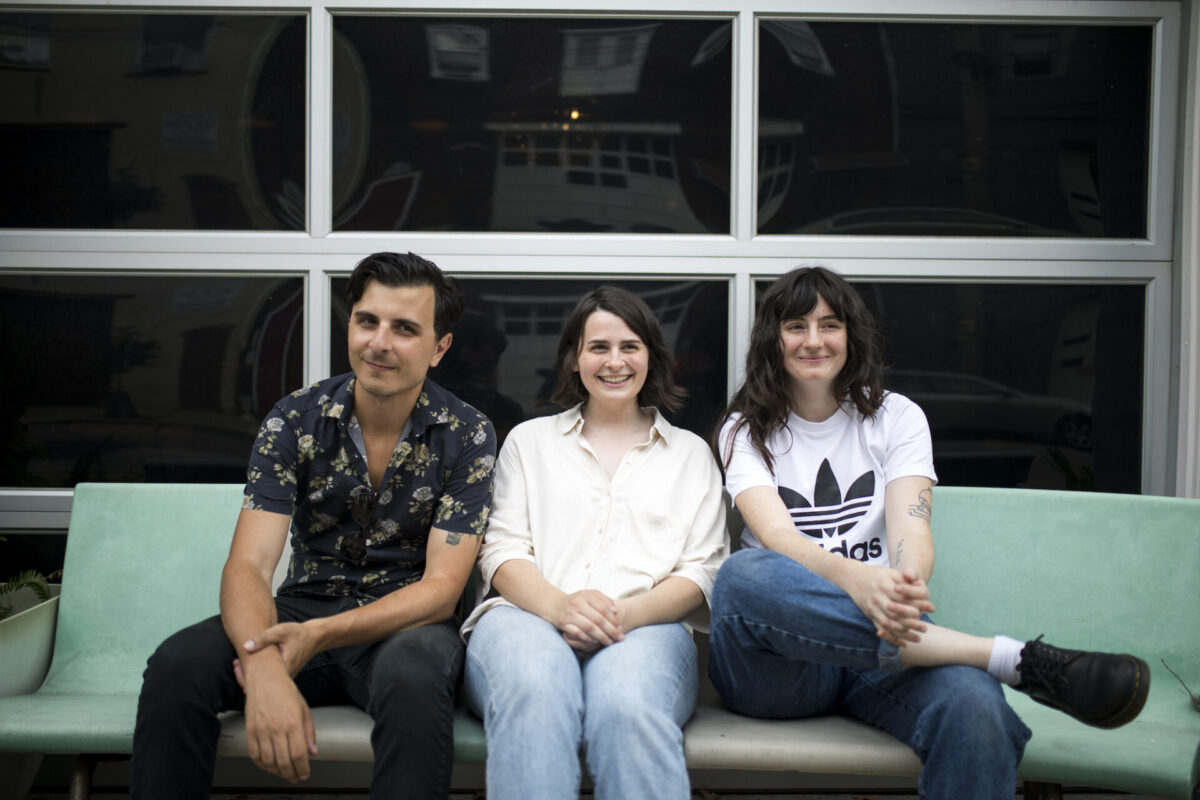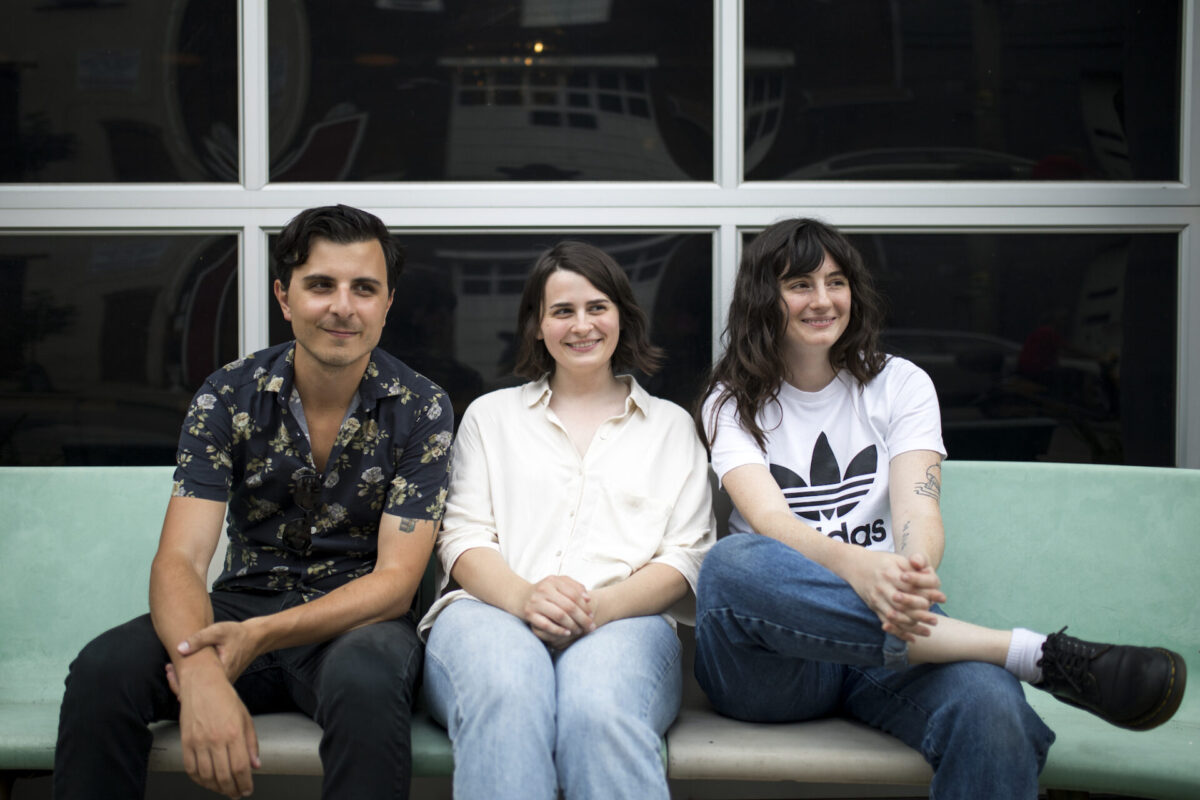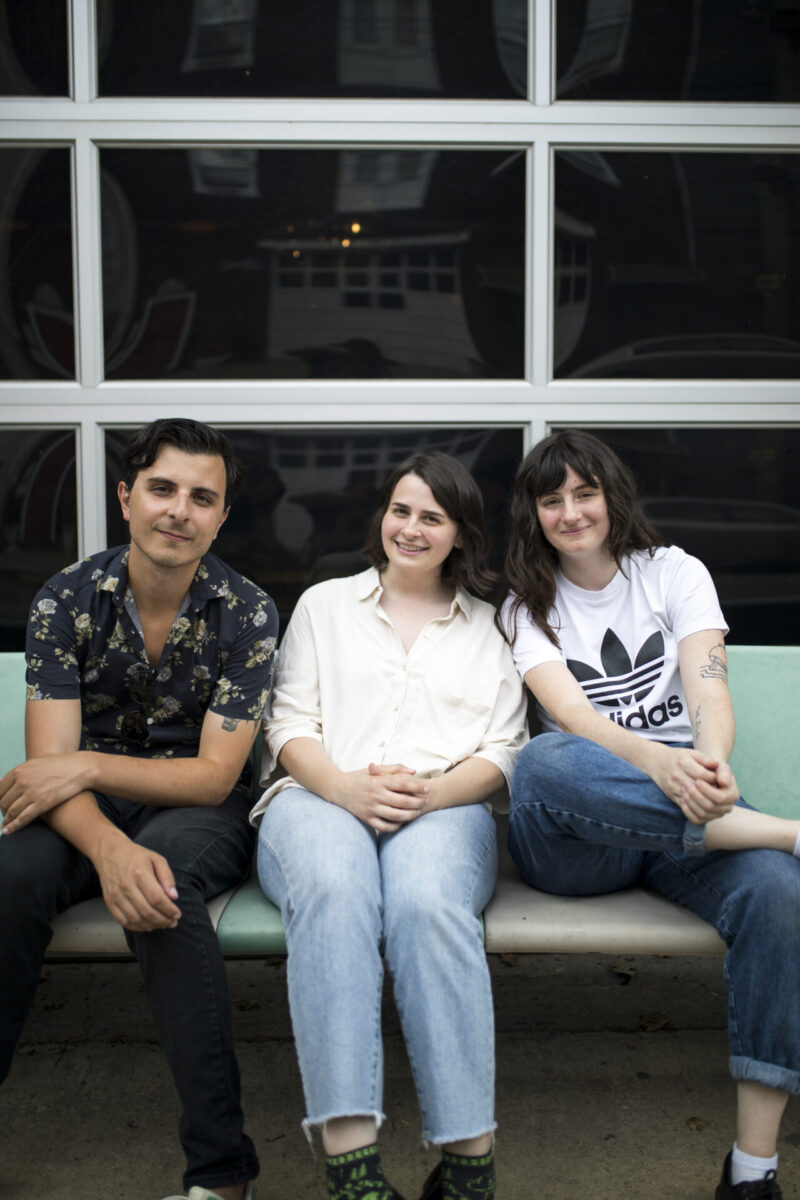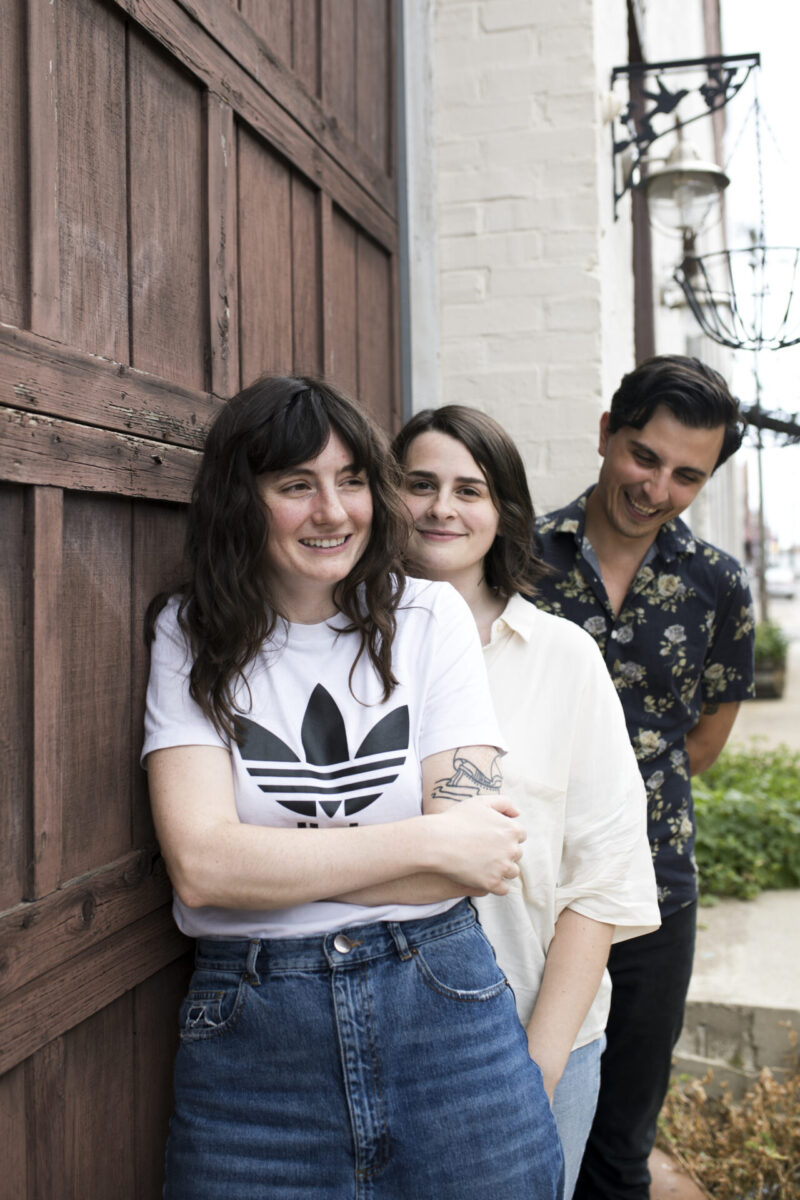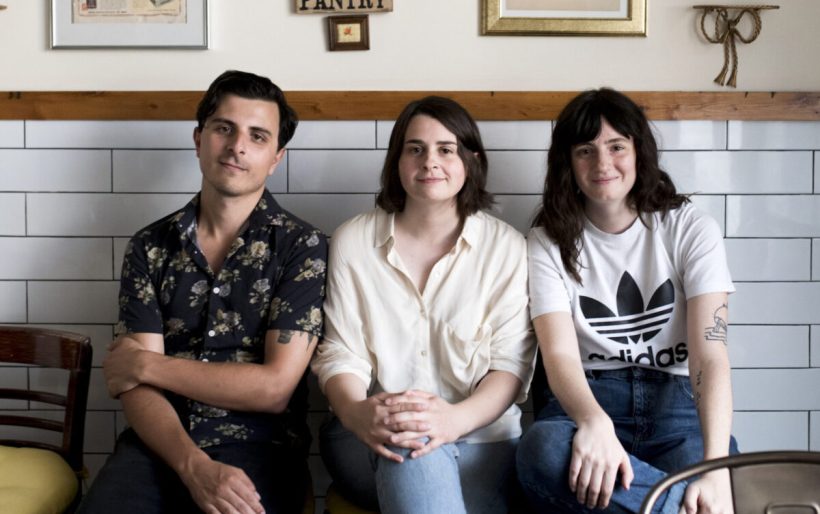
Queen of Jeans | photo by Rachel Del Sordo for WXPN
No Fear: How Philly indie faves Queen of Jeans made their empowering new album
On a breezy Friday night this spring, Queen of Jeans achieved two impressive feats in the elegant, austere Great Stair Hall of the Philadelphia Museum of Art.
As wine moms and business suit clad dads moved back and forth between exhibits, juggling hummus plates and cheese boards, the Philadelphia four-piece gave a performance that broke out of the background, stopped the crowd in its tracks, even if only for a moment. Their riffs and rhythms cut through the space’s cavernous, reverberant acoustics, which are notoriously unkind to rock bands. More accurately, the band worked with the sound of the space, using it to elevate the drifting, dreamy quality of their songs, punching it up with fervent emotion on new numbers like the psych / motorik pulsar “Bloomed,” which radiated from the vaulted ceiling several stories up.
That song, and six others like it that the band debuted that night, were the other feat in question. Queen of Jeans’ hour-long Art Museum set, its first hometown show in a long stretch at that point, featured mostly new material. And it sounded fantastic, reintroducing and recasting these Philly indie favorites as formidable players outside the retro-pop space they had on lock. Their next album, I knew at the time, was going to be something truly special.
“I guess you’re not really supposed to reveal all your new songs at a show,” laughs guitarist Mattie Glass as we discuss the gig several months later. It was release week for Queen of Jeans’ sophomore outing, If You’re Not Afraid, I’m Not Afraid, a record that does indeed live up to the promise of that night. Sophisticated, sentimental, and deeply contemplative, it finds the band stretching its sound in exciting directions while meditating on love and loss, heartache and anger, propelled by the passing of singer and songwriter Miri Devora’s mother, and the generally bleak state of the world in 2019.
We’re grabbing drinks at Second District after wrapping up a photo shoot at South Philly vegan eatery Miss Rachel’s Pantry, one of Queen of Jeans’ favorite spots, and Devora reflects back on that concert, and how the understated reveal of the new album was natural.
“I think when we first started, we were constantly playing new music,” she says, noting that the entirety of the band’s debut album Dig Yourself was part of their setlist long before its release. “We’d been playing all those [songs] for so long, so of course we’re excited about these. And this album as a whole is very cohesive, and it fits with our older songs to make the set near-flawless.”
So what brought about that leveling up of sorts? Glass attributes it to the band feeling more empowered than ever this time around, despite everything they’re up against.
“When we first started out playing in groups, we were sort of like the token female,” she says. “And then when we broke off to make this group, we felt so liberated! We were fronting our own group. But I think there were all these insecurities we didn’t even realize we had. So to a certain extent, we were still playing into something a little cutesier.”
“It’s just a growth, like all songwriters go through,” Devora adds. “And I think I’m finally hitting my stride. I think that’s why it’s so different.”
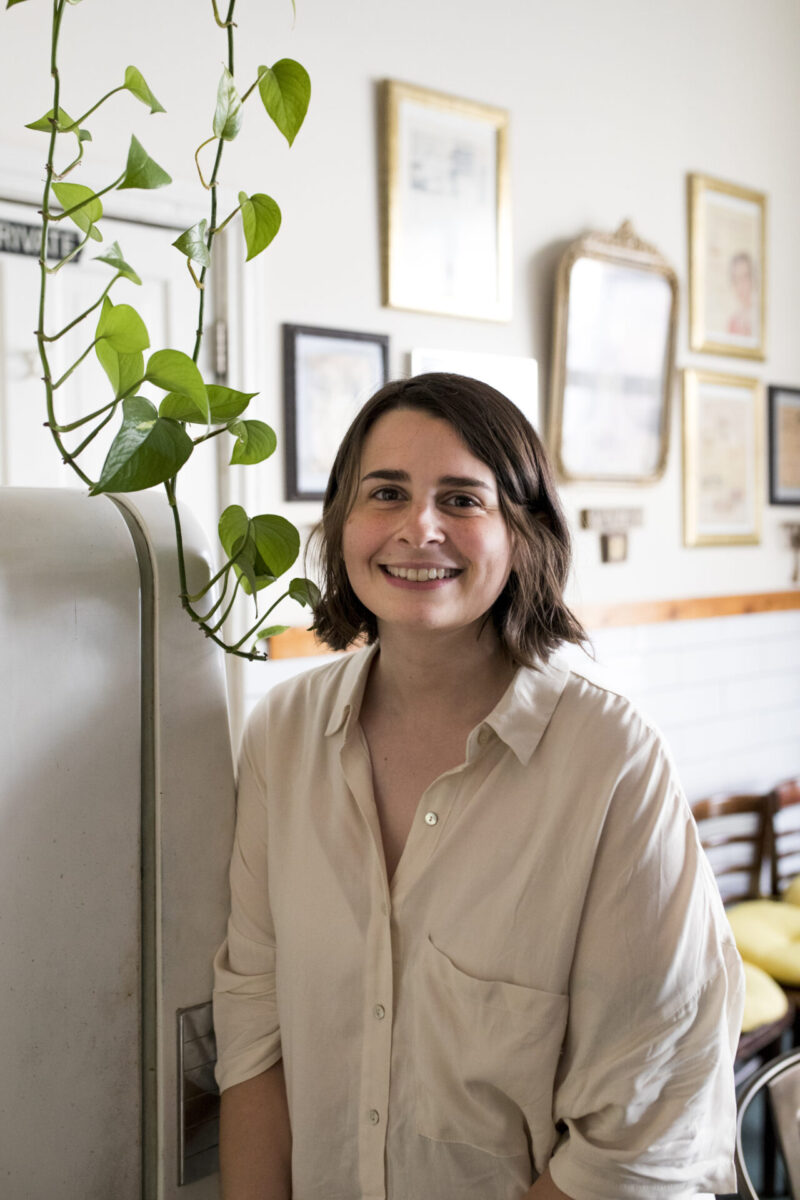
Miri Devora of Queen of Jeans | photo by Rachel Del Sordo for WXPN
The three members of Queen of Jeans have musical histories dating back to their childhood. Devora, who grew up in Bucks County, learned how to play guitar at age 12, but at the time was more focused on her voice. She sang in choirs in middle school and high school, went through a deep theater phase where she obsessed with Wicked and Rent, and later graduated to old psychedelic pop records from the 60s, as well as bands inspired by them in the 00s. At age 16, she starting writing poems that she realized could easily become songs with a little rhythm guitar foundation.
“I stick to that, though,” she says. “I don’t do a ton of riffing. I do like to write parts, but I just have Mattie play them because she’s a way better player than I am.” Glass scoffs at this, and Devora insists that it’s true. “You don’t lose your cool! Whereas I do, when I’m forced to play a solo: I’m like ‘uhhhhhhh I’m gonna fuck up.’”
Glass’ background was not in pop at all, or psychedelic music. When the Delaware County native picked up guitar, she her circle of friends were big into metal and rap. The first guitar parts she learned were from Metallica and Slayer songbooks. “And then when I was in seventh grade, a friend was like ‘Do you want this CD? It’s trash.’ It was a Dashboard Confessional album. I listened, and everything opened up, my life was different. I learned all the emo tabs I could find – I was the only one I knew who liked emo music.”
Drummer Patrick Wall’s tastes were more in line with Glass’ than Devora’s. He played a lot as a teenager in Northern Virgina, but tells us it had been a solid decade since he’d done anything musical worth mentioning. He moved to Philadelphia in his mid-twenties to take a sports writing job, trying in vain to find people to play music with.
Meanwhile, Devora and Glass were struggling with their own bands where they felt tokenized and objectified. Glass says that one of her pre-Queen of Jeans projects “started out as ‘you’ll do some vocals, you’ll also play guitar, sax, and percussion.’ But somehow it devolved to mostly me dancing and singing backups, which are two things I’m not that great at. I didn’t feel like I was using the skill sets I wanted to use in a band.”
Devora had a near identical experience in one of her early bands. “I felt like I’m just the girl who’s awkwardly dancing,” she recalls. “I hate wearing dresses, I hate dressing up, but I always ‘had to be in a dress.’”
Even if it felt not-fantastic at the time, Glass said the experience gave her confidence and the reassurance that, yes, she can get onstage. Yes, she can play music in front of people. “And like any breakup, it causes you this bravado where you’re like ‘I’m going to go out and do something that’s about me and my empowerment.’ So in that sense it was a very positive thing.”
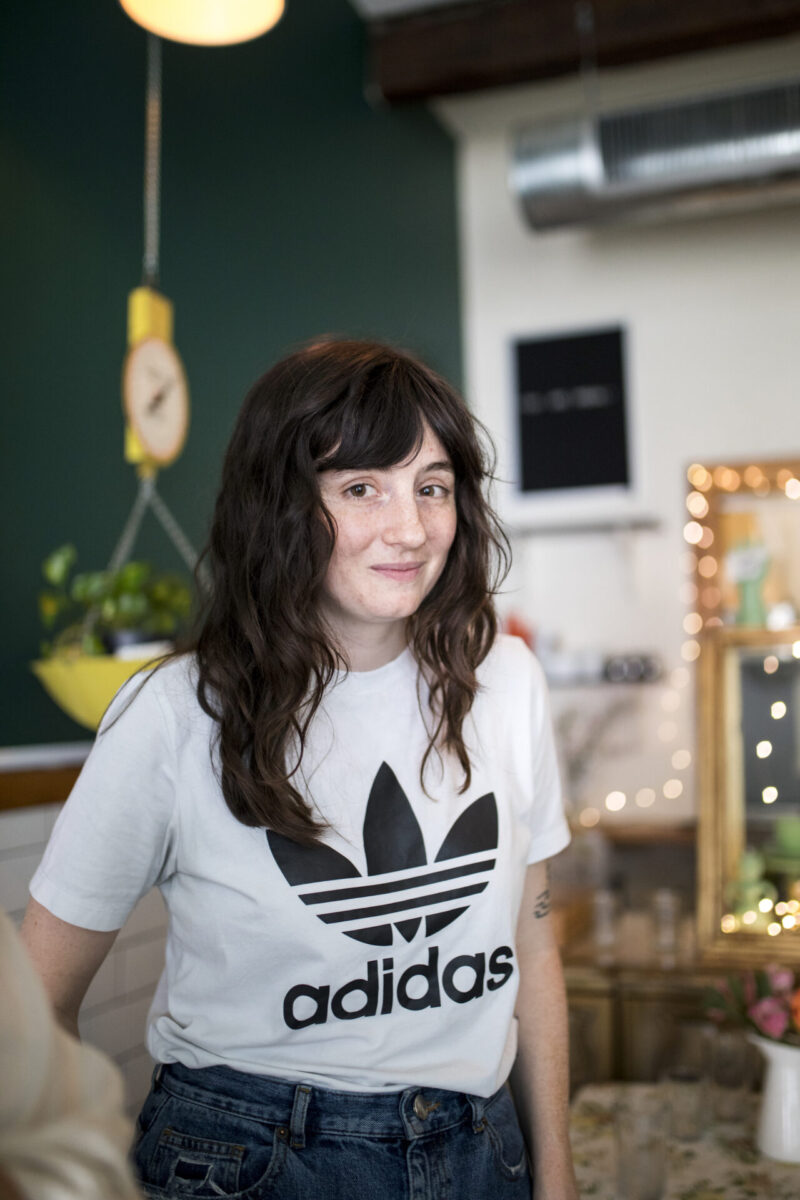
Mattie Glass of Queen of Jeans | photo by Rachel Del Sordo for WXPN
In between projects, Devora had been casually writing and recording bedroom demos to stay in practice, and playing them to Glass for laughs. Upon hearing them, Glass told her that these songs were actually great, and could be pursued at a deeper level if they worked together. They went in search of people to help bring them to life, which led to Wall.
“I’d been looking for a band since I moved to Philly, which at that point was five years,” he says. “It was that classic thing: I wasn’t really in the scene so I didn’t really know anybody, and it was a lot of Craigslist ads with people who were all talk.”
He’d posted a last-ditch Craigslist ad of his own, and it had been lingering in the ether for a month by the time Devora, Glass, and then-bassist Nina Scotto got in touch.
“I remember hearing their EP to learn the songs,” he says. “And I remember thinking that if I don’t screw this up, this band could change my life.”
During the first practice, the bandmates-to-be discovered an instant chemistry. “Not only did he play flawlessly, he said he’d never played them on a kit before.”
That practice and subsequent early gigs went smashingly. Swinging songs like “Dance (Get Off Your Ass)” and the surfy bop “Rollerdyke” proved instant favorites around the Philly music scene. The band’s debut, Dig Yourself, cemented their virality – both with a John Hughes-esque trailer announcing their signing to Topshelf Records, and a brilliantly satirical pep rally video for “U R My Guy,” both made in collaboration with videographer Bob Sweeney.
“We weren’t trying to do a shtick that would get internet attention,” says Glass. “We just always just think what would be fun, and that’s what we do.”
But in those earliest days of Queen of Jeans, their influences didn’t completely gel. Not like they do today. “It would be a little jarring,” Devora says. “[Patrick] might play a drumbeat that was more akin to what [he’s] listening to, for example.” But the more time they spent together, the more their tastes rubbed off on one another; Devora began to explore artists like Death Cab For Cutie and Jimmy Eat World, while Glass and Wall put more Camera Obscura and Rilo Kiley in their playlists.
“Now it’s like we’re all hugging,” says Devora. And now, Wall says his hopes have become reality. Four years and thousands of tour van miles in, Queen of Jeans has solidly changed his life.
“How often does that happen? It’s pretty incredible.” he says. “I met my best friends and my girlfriend because of this band, I think I’m doing pretty good.”
“Who are your best friends?” asks Devora.
“Oh you haven’t met them,” Wall responds with a cheeky stare.
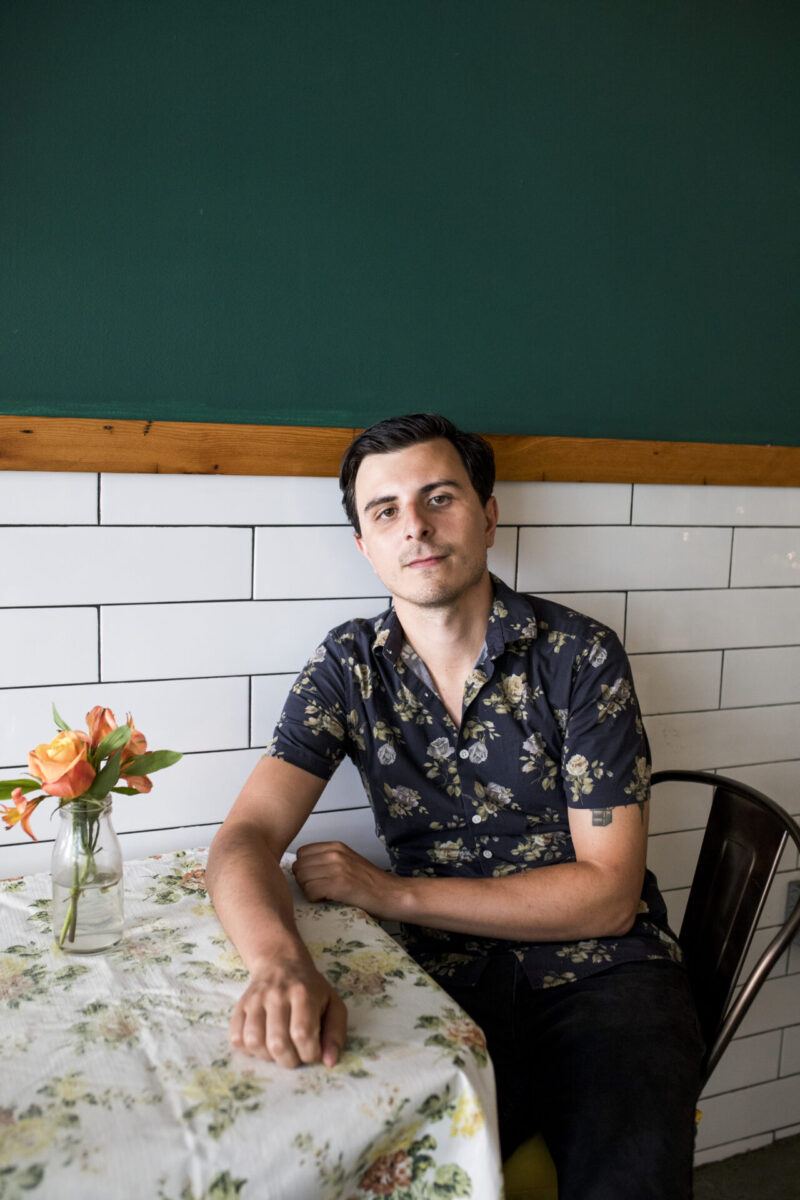
Patrick Wall of Queen of Jeans | photo by Rachel Del Sordo for WXPN
As bright and upbeat as Queen of Jeans can be musically, their lyrics often take a more somber approach, either implicitly or outwardly. When they played Underground Arts in 2018 to celebrate the release of Dig Yourself, Devora took an emotional moment to acknowledge her family’s presence and thank them for their strength in the wake of several losses; her grandmother’s passing, as well as her uncle’s.
In our interview, Devora says “I’ve had a lot of people die in the last couple years.” She smiles, then catches herself. “I didn’t mean to laugh at that. It’s just how I cope.”
The most difficult loss, though, was the most recent. Twelve days before Queen of Jeans was set to go into the studio to record If You’re Not Afraid, Devora’s mother passed away after a long fight with cancer.
“In the year I was writing the album, my mom was at her sickest,” she says. “She had cancer for four years, then she had a brief time when she was in remission. But the cancer spread, so for the last year, it was really difficult. I was dealing with all those emotions, and the reality was setting in that my mom was going to leave.”
It powerfully affected Devora’s life post-Dig Yourself. When she and the band weren’t on the road supporting the album, “I was isolating myself from friends, and even my family, to kind of process things,” she says. “I didn’t want to go out, I didn’t want to have fun, I just wanted to be alone.”
Solitude gave her lots of time to think, and to channel those thoughts into her songwriting. The expansive album opener “Get Lost” finds her reflecting on loss, and the importance of taking time for yourself in the wake of personal trauma. “Gonna see myself out,” she repeats at the end of the song, and though it could be read on the surface as a story of romantic love, it also works as a personal metaphor. It was her means “to accept and understand that what I was feeling wasn’t bad and was natural, and everyone has their own way of processing things.”
Even keeping to herself, Devora could not escape the exhausting and emotionally sapping 24-hour news cycle, filled with harrowing stories of immigrant children separated from their parents and kept in cages, states restricting the rights of women and the rights of LGBT individuals, and just about anything that lands on Twitter from the Oval Office.
“I was thinking a lot about where I see myself as a queer woman in society,” Devora says, something she says amounts to “living in fear.” Her biggest fear at that time was losing her mom, but everything she read in her newsfeed was not far behind, and that mix of anger and dread coalesces into the album’s most pointed, political lyric on the soft rock shuffle of “Tell Me”: “While you spew sick intolerance / I’m afraid to leave my house / you can’t sign away my rights on the dotted line.” No mistaking what that’s about.
The soaring atmospheres of “Only Obvious to You” also read as a breakup song on the surface, but paired with a music video that Glass, Wall, and Devora shot at Philly Pride, it becomes much more.
“Pride was coming up, my brother had texted me to ask if I get annoyed when I see all these corporations doing Pride stuff,” Glass says. “And I don’t get annoyed, because I think any visibility is good. It does normalize things.”
She remembers going to high school in the aughties with 4000 kids, maybe one of whom was out; it’s a huge difference from the experience her younger sister had at the same school almost a decade later.
“I do think representation has gotten a lot better. And part of it is the fluffy stuff: Cheerios commercials with two dads,” she says. “But that’s not all I want to see, and I do like when I see a more complex version, a more normal version that’s not just trying to prove that we are people too by being happy parents with a product.”
At Pride, Queen of Jeans wandered the crowd bribing attendees with soft pretzels to sing along to “Only Obvious to You” while they filmed on their iPhone. Everybody they encountered was into it, they say, and while the setting lent the heartbreaking song some levity, Glass tells us those dynamics go both ways.
“I mean, it’s a pretty sad message at times,” she says. “’Love will always fuck you over.’ That’s something anybody can feel no matter what your gender or sexual identity is.”
Partly it was Devora’s heightened confidence as a songwriter, partly it was the emotional rollercoaster her life had been through in recent years, but in writing If You’re Not Afraid, she took a leadership role more than ever.
“Sometimes you do need that director to get you there,” she says. “And I really tried with these songs to support them and guide them to where I felt like they’d sound better and tighter.”
Working with Glass to fine-tune their ideas was easier, Devora says – she could communicate ideas from one guitar player to another with total clarity. With Wall, it was more of a challenge. Sometimes she would sing what she wanted for a beat; in one case, Glass recalls that Devora “took an iPad and slammed her fingers [in Garage Band] to make this crazy drum part. He was like ‘is this even possible?’”
“It’s not!” Devora laughs. “But he did it, and he made it even better.”
The direction of record was further shaped working with producer Will Yip. He’s known for his work with modern rock artists like Circa Survive, The Menzingers, and Tigers Jaw, as well as more pop-leaning names like The Fray. He’d been a Queen of Jeans fan for a couple years, and first encountered them as they were recording Dig Yourself at the suggestion of his manager and friend Tim Zahodski.
“I fell in love with them,” Yip tells us over email. “The overall vibe of the band just blew me away. It was fresh, even though the influences were very ‘retro,’ it was just a unique sound to the ears!! I remember texting Tim back the second Miri’s voice came in saying ‘I need to work with these guys.’ I knew they had star potential from the second I heard them!!”
The band describes working with Yip as “such a game changer” and says he became a collaborator in the studio as much as the person documenting all their songs at the console. They’d play each song live, then go into the control room and watch as he took chunks of the recording and moved it around, suggesting new structures, identifying places where a new chorus or bridge could take a piece of music to that proverbial next level.
Yip describes the experience as a blast, and says his favorite experiences in the studio are when bands let him in on that process. “I’m beyond grateful the band let me be a part of it,” he says. “Everyone was just down to try ideas that maybe they wouldn’t have tried without an outside ear inside the process, which allowed for just fun times building the songs and really exhausting ideas!!”
“It took us out of our DIY comfort zone,” Devora says, quick to add that the band loved working with their friend Brian Ziprin on Dig Yourself. But there’s a huge difference between recording in fits and starts — some tracks in a Kensington practice space, some tracks in a house down the shore, stretched over a period of months — and recording in a concentrated two-week marathon, six days a week, ten hours a day.
“I was like, ‘I want this to be my job forever,’” Devora says. “’Can I just be a session singer? I want to do this every day.”
The band was also wowed by the history at Yip’s Studio 4 in Conshohocken, where legendary local producers Joe and Phil Nicolo worked on music with everybody from The Fugees to Billy Joel.
“You’d just walk through the hallway, and there were all these gold records from albums that had been recorded there,” Wall said.
“We played the piano Billy Joel used for ‘River of Dreams’!” Devora exclaims.
“The mic you used was the one Lauryn Hill recorded ‘Doo-Wop’ on,” Wall adds. “I was around for most of it. I don’t think any of us take anything for granted. ‘Will I ever be in a studio like this again? I don’t know. I’m going to be here every day I can.’”
The experience profoundly impacted the way Queen of Jeans works. “In the past, I’d come in with a song, and the band would say ‘this is great!’” Devora says. “Here, I’d come in with a song, and Will would say ‘this is great! But! We can make it better.”
“I wanted to help make the record this incredible band deserved,” Yip says. “And together, we did just that!!”
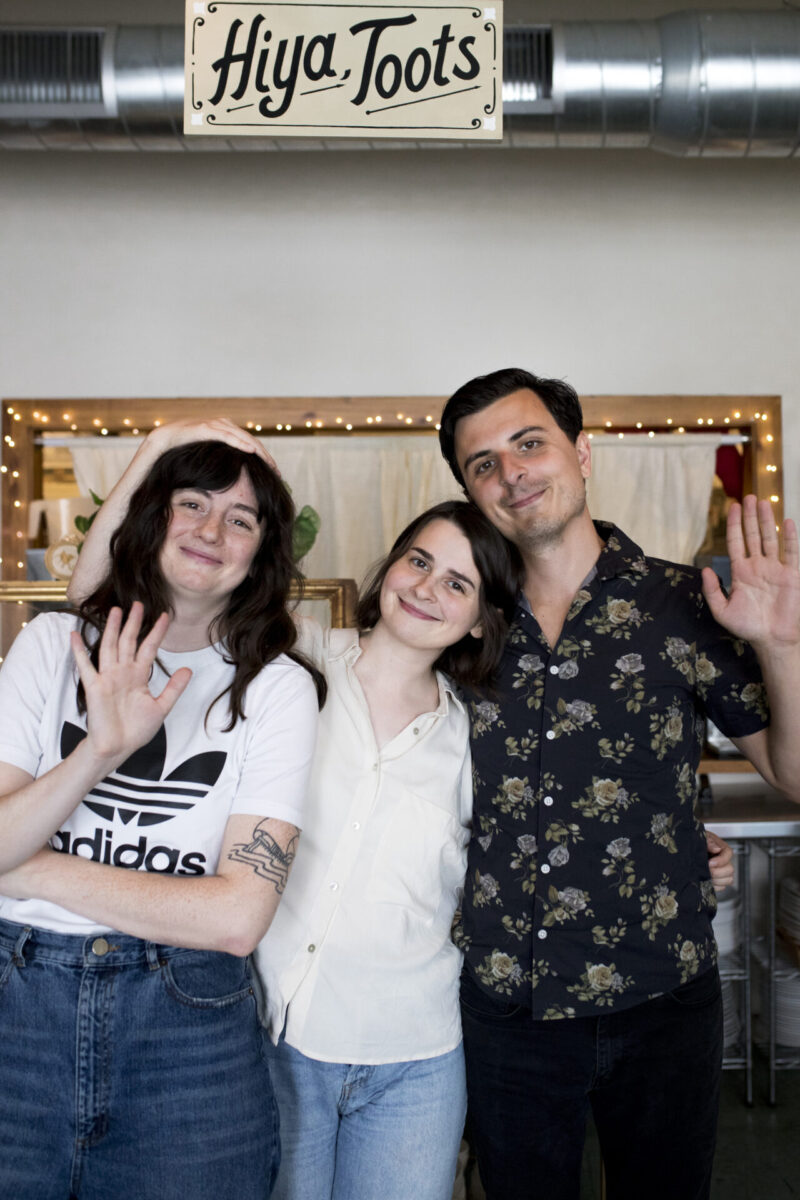
Queen of Jeans | photo by Rachel Del Sordo for WXPN
Devora’s mother passed away on December 21st of 2018; the band was scheduled to go into the studio on January 2nd of 2019.
“I didn’t want to hold off, because I knew that the best way to honor my mom would be to just do it,” Devora says. “I know that’s what she would want.”
The loss was always there in the back of her head, but the immersive experience at Studio 4 both distracted her from it, and helped her process and grieve in her own way.
“It felt like if it had to happen, it was a fitting way for it to happen,” Devora says. “Because I always use music as a way to cope with negative feelings.”
The cover of the resulting album is an additional memorial: a striking black and white photo of Devora’s mom as a teenager, crouched on a carpeted floor in a plaid shirt and high-rise jeans, hair draped shaggily in her face, a bit chic, a bit playful, a bit mysterious.
“That photo is part of a series called ‘Our Studio Shots,” Devora says. “My mom and her best friend, who I call my Aunt Joyce, would just be hanging out, probably smoking weed, and they’d take pictures of each other, modeling shots. There’s a whole album of stuff like this, them hanging out, having fun.”
“She looks so cool,” Glass says.
“She’s just being a goof,” Devora adds. “And that’s my mom. We really wanted to honor her, beyond just putting her name in the liner notes. We wanted her to be part of the album, because it’s inspired so much by what she went through and what we experienced as a family as a result.”
Getting through those dark and desperate times with positive forward momentum could be the overarching theme of Queen of Jeans’ latest record; its why they chose If You’re Not Afraid, I’m Not Afraid, a lyric from the somber closer “Take it All Away,” as the title. Devora sees it as a reflection of recognizing your fears, being able to accept them, and finding a sense of release.
“For me as a songwriter, I’m trying to bridge a gap between me and another person, whether its [my bandmates] or it’s somebody who’s happens upon our music and something resonates,” Devora says. “So using that as the title, it’s a call to people that, whatever you’re facing, let’s face it together, let’s approach it together.”
Ominous, unsettled, but filled with strength – it couldn’t be more perfect place to arrive, after all that Queen of Jeans has been through.
- Queen of Jeans | photo by Rachel Del Sordo for WXPN
- Queen of Jeans | photo by Rachel Del Sordo for WXPN
- Queen of Jeans | photo by Rachel Del Sordo for WXPN
- Queen of Jeans | photo by Rachel Del Sordo for WXPN
- Queen of Jeans | photo by Rachel Del Sordo for WXPN
- Queen of Jeans | photo by Rachel Del Sordo for WXPN
- Queen of Jeans | photo by Rachel Del Sordo for WXPN
- Queen of Jeans | photo by Rachel Del Sordo for WXPN
- Queen of Jeans | photo by Rachel Del Sordo for WXPN
- Queen of Jeans | photo by Rachel Del Sordo for WXPN
- Queen of Jeans | photo by Rachel Del Sordo for WXPN
- Queen of Jeans | photo by Rachel Del Sordo for WXPN
- Queen of Jeans | photo by Rachel Del Sordo for WXPN
- Queen of Jeans | photo by Rachel Del Sordo for WXPN
- Queen of Jeans | photo by Rachel Del Sordo for WXPN
- Queen of Jeans | photo by Rachel Del Sordo for WXPN
Queen of Jeans celebrates the release of If You’re Not Afraid, I’m Not Afraid at Boot and Saddle this Friday, September 6th. Tickets and more information can be found at the XPN Concert Calendar.



